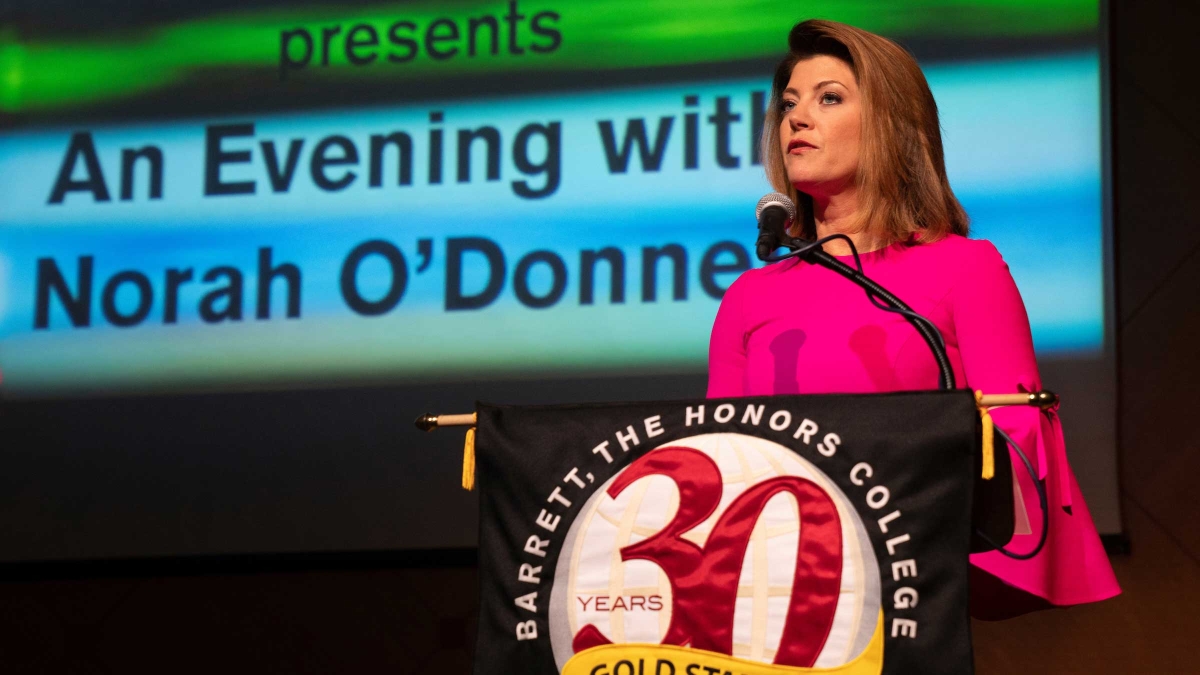Norah O'Donnell delivers 29th annual Flinn Foundation Centennial Lecture

After centuries of oppression and silenced voices, Emmy Award-winning journalist Norah O’Donnell predicts meaningful change is on the horizon for women around the world.
“The 21st century will be the century of women,” O’Donnell, the co-host of “CBS This Morning” and a contributor to “60 Minutes,” said to a nearly packed house at Katzin Concert Hall on the Arizona State University Tempe campus Tuesday night. “We are now at a place where we can create our own destiny and change the course of history.”
The veteran Washington correspondent was on hand to deliver the 29th annual Flinn Foundation Centennial Lecture presented by Barrett, The Honors College. Established in 1985, the Centennial Lecture has become one of ASU’s premiere events, featuring noted diplomats, scientists, playwrights and authors.
Barrett selected O’Donnell because they had a specific purpose in mind, said Mark Jacobs, dean of the college and ASU vice provost.
“Norah O’Donnell was selected because she is a noted and experienced journalist who has covered Washington politics for six presidential elections and the host of a prominent television news program,” Jacobs said.
He added that in an era of the #MeToo movement, more women are running for elected office throughout the United States, women's presence in business, media and politics is expanding and that “it would be interesting for students and others alike to hear from someone of O’Donnell’s stature and experience.”
O’Donnell, who has traveled around the globe to interview some of the world’s most notable figures in her more than two decades as a journalist, delivered. She shared her observations on a wide variety of topics: the personalities and politics driving Washington, D.C., the work of women in politics and media, her past year at CBS and the upcoming Nov. 6 midterm elections.
“It’s an important time to come here and talk to all of you … to discuss a critical time in our democracy,” O’Donnell said. “It’s 14 days before the elections and we are in the midst, I believe, of a defining moment.”
O’Donnell said it has also been a defining moment for her. While she experienced the best year of her career, it was also the most challenging. She met with Nobel Peace Prize winner Malala Yousafzai on the floor of the United Nations, was the first journalist to interview South Korean leader Moon Jae-In and conducted the only television interview with Saudi Arabian Crown Prince Mohammed Bin Salman, which she said took her three years to get. She and her producer also received an Emmy Award for a piece on sexual abuse and harassment at the United States Air Force Academy.
She said at the same time, her network had been at the center of several #MeToo allegations, which she had to report on air with her co-anchor Gayle King. In November, she and King had to deliver the news that their co-host, Charlie Rose, was being accused of sexual harassment by eight women. Fifteen minutes before they went on the air, they were told they had to announce the news to a national audience.
“In a really powerful moment, it all became very clear to me,” O’Donnell said. “After so many years of writing about women’s inequality in the workplace, I realized the women have struggled and hadn’t reached the top echelon not because they weren't ambitious enough or skilled enough or educated enough. They’ve left our military, our newsrooms, our operating rooms, our corporate boardrooms because they were being systematically harassed.”
O’Donnell said women cannot achieve equality in the workplace until there has been a reckoning and the taking of responsibility. Things are still shaking out in regards to recent allegations of sexual misconduct against Leslie Moonves, the CEO of the CBS Corporation and one of the most powerful media executives in America. A few days after the Moonves news broke, “60 Minutes” producer Jeff Fager was fired amid allegations of inappropriate conduct.
“I dare say, no other media organization has had so many high-profile men brought down by the wave of the #MeToo movement,” O’Donnell said. “And no two women have had to address it more frequently in a public forum on live television than Gayle King and myself.”
Despite the negative attention, O’Donnell believes "a new day is almost here."
“Change is happening pretty swiftly,” she said. “The reckoning is moving swiftly. It demands truth. It demands justice. It demands equality.”
O’Donnell said that reckoning shouldn’t be like a buzz saw that cuts people down to size — rather it’s the sunlight that shines and finds the rot.
"Trees full of rot fall hard,” O’Donnell said.
She said she has learned the pain and deep anguish that harassment can cause, crushing souls and careers. But through that hardship, she has found her voice, she said.
“So I’m going to try and use that voice in search of the truth, something we always try to do as journalists,” O’Donnell said.
Top photo: Norah O'Donnell speaks at a Barrett, The Honors College event at Katzin Concert Hall in the ASU Music Building on Tuesday evening. Photo by Marcus Chormicle/ASU Now
More Law, journalism and politics
Can elections results be counted quickly yet reliably?
Election results that are released as quickly as the public demands but are reliable enough to earn wide acceptance may not always be possible.At least that's what a bipartisan panel of elections…
Spring break trip to Hawaiʻi provides insight into Indigenous law
A group of Arizona State University law students spent a week in Hawaiʻi for spring break. And while they did take in some of the sites, sounds and tastes of the tropical destination, the trip…

LA journalists and officials gather to connect and salute fire coverage
Recognition of Los Angeles-area media coverage of the region’s January wildfires was the primary message as hundreds gathered at ASU California Center Broadway for an annual convening of journalists…

